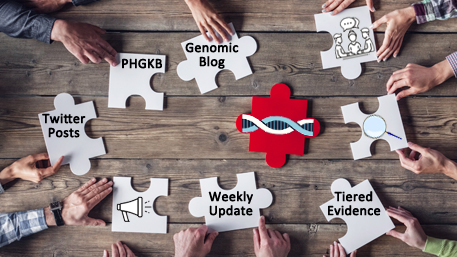Search Results
9 results for colorectal cancer
Precision Medicine in Action: How can we make cascade screening for hereditary conditions work best in the real world?

If someone in your family were diagnosed with a genetic condition, would you want to be tested for that condition as well? For some disorders, like Huntington’s disease, for which there are no means available for prevention or cure, the question can be extremely difficult to answer. However, with many other conditions (for example familial
Posted on byThe Long Road to Population-based Genomic Screening

Since 2012, the CDC Office of Genomics and Precision Public Health (OGPPH) has identified three autosomal dominant conditions for which there exist evidence-based recommendations to prevent morbidity and mortality from either cancer or heart disease. Using our evidence-based framework, we have collectively labeled the following conditions as tier 1 genomic applications: 1) hereditary breast and
Posted on by 3 CommentsCommunication and Information Sharing about Genomics and Precision Health: Opportunities for Improvement

In this blog, we describe our current approach to information sharing based on a recent review of our communication and engagement strategies. In order to improve our approaches to communication, we are asking you, our readers, for feedback—please share your thoughts in the comments section below or send us an email at mailto:genetics@cdc.gov. For the
Posted on byHappy Thanksgiving 2019: Collect and Share Your Family Health History: It Could Save Your Life!

Happy Thanksgiving Day! It is time for our yearly message on the importance of family health history to your own health. Year after year we promote the value on family health history around Thanksgiving day and all year round. By knowing and acting on your family history, you can reduce your disease risk and actually
Posted on byHow Genetic Counselors are Dealing with Direct-to-Consumer Genetic Testing

After receiving ancestry information from a direct-to-consumer (DTC) genetic testing company, Ellen Matloff, a certified genetic counselor and frequent writer about the limitations of DTC tests, downloaded her raw data file from their website for interpretation by a third party service. She was shocked to see that her raw data included a variant for Lynch
Posted on byHappy Thanksgiving 2018: Protect your family’s health by using My Family Health Portrait to collect and share your family health history

Happy Thanksgiving Day! It is time to send our yearly message on the importance of family health history to your own health. Every year we emphasize a slightly different version of this message. In 2017, we highlighted the simple fact that even in the age of genomics and precision medicine, family health history remains as
Posted on byHappy Thanksgiving 2017: Take time to collect, share, and act on your family health history, it may save your life!

Regular readers of this blog may have noticed that we have an almost identical message around each Thanksgiving Day. Collect, share, and act on your family health history! It seems every year we emphasize a slightly different version of this message. In 2016, we highlighted the emergence of new tools that can help consumers and
Posted on byImplementing Evidence-based Genomics Recommendations at the Intersection of Public Health and Healthcare

We take the opportunity of March 22, 2013, designated as Lynch Syndrome Awareness Day by 13 U.S. state governors and counting, to highlight state public health genomics programs that are taking innovative approaches to implement evidence-based genomic testing recommendations for hereditary cancer syndromes, including Lynch syndrome.
Posted on byNew Strategies For Public Health Genomics Beyond Newborn Screening

A Working Meeting and an Action Plan to Save Lives Now Nearly 2 million Americans are affected by one of three genetic conditions with a strong risk of early morbidity and mortality: BRCA 1/2 and hereditary breast and ovarian cancer; Lynch syndrome and colorectal , endometrial and ovarian cancer; and familial hypercholesterolemia and early cardiovascular events. At
Posted on by 2 Comments

